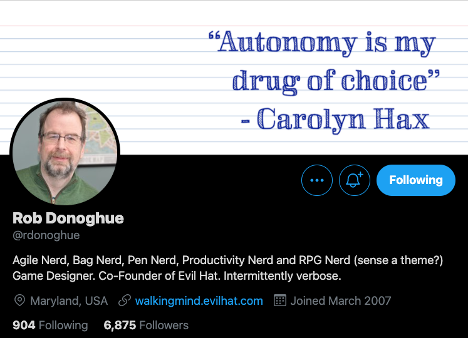In trying to research improvements to Dungeon World’s Volley move, I came across a 2014 post from Rob Donoghue, one of the inventors of Fate and a co-founder of Evil Hat. This led me into his blog posts of his initial plays of Dungeon World. Here’s the first two:
- D20 and the D&D Off Ramp
- D&D Off Ramp – Why These Three?
- Here are his DW-centric posts, when he started tagging them DW. They are a bit of a pain to read chronologically (involves scrolling back up).
I really like his take on a new Discern Realities move:
One idea I’d been toying with was to give each class an extra question on the Discern Reality move (so the fighters could ask “Who’s the biggest threat?”, thieves could ask “What’s the most valuable thing here?” and so on) but as I think about moving this to a meta level, I wonder if that should be more implicit in the question. So what if we also decouple the move from Wisdom, and instead allow the player to pick any stat, but the stat flavors the answer.
Strength – Military/fighting focus
Dexterity – Subterfuge and hidden things
Constitution – Integrity and defense
Intelligence – Details and knowledge
Wisdom – Secrets and insight
Charisma – Motivations and Personality
Yes, it’s a bit abstract, but if the move itself is in the abstract, that is not necessarily a bad thing. And with that tweak, I am pretty happy leaving it in the toolkit.
I also loved his idea for having a move for each PC when their player is absent, from Dungeon World: The Tale of Old Dogan:
I want to write up a set of moves, one per player, that can be used once per session to represent the influence of absent characters. So “Jack knows a guy” may allow the current game to hook up with a useful NPC when Jack isn’t at the table. I doubt this is something that many games need, but for my rotating cast, I think it’ll be a nice way to keep it feeling like everyone is in circulation.
[This resonated so much that we adapted it for our campaign: Character Moves When the Player Is Absent.]
In this 2014 post on transitional scenes, Making the Transition, he comes up with something that might have been a forerunner of Blades in the Dark:
While some moves are all about what you do in a scene, you can now write moves that are all about transitions. Consider something simple like a Breaking and Entering move: “When you break into a guarded place to steal something, roll +DEX. On a 10+, the scene starts with your quarry in reach. On a 7–9, the next scene starts with one major obstacle between you and your quarry.”
It’s a bit ham fisted. but it conveys the idea – you’ll never make this move in the middle of a scene, where there’s any other interaction, but rather, you’d make it in the downtime between scenes, when planning and discussion are afoot.
Rob had similar problems to what I’ve experienced with bonds, as he wrote in Dungeon World Identity Mistakes:
I desperately need to find a better way to handle bonds. I have a dozen players, but only 3–6 each session, and there’s no way to be sure whether your bond folks are going to show up. Also, honestly, some of the bonds they do have are kind of lame over longer term play, but constantly coming up with new ones is just a hassle. I have some ideas for addressing this, but I need to chew on it a while.
(See my hacked End of Session move for how I copied Stonetop’s replacement of bonds.)
Oh, and here’s what got me started on this, Rob’s take on Volley:
Look at the third option: “You have to move to get the shot placing you in danger of the GM’s choice”.
I’m not 100% comfortable with the way the GM choice is framed here. There are two ways to read this. The first is “A danger to be determined after you’ve decided”, which is a fiddly proposition. The second is that the GM communicates the details of the danger in the fiction so that the player can make a real choice.
And that’s where it crystalized.
That second interpretation doesn’t seem like it would be a problem. Hard choices are awesome, after all. But it reveals that this is really a soft choice. because the player can always opt not to make it (by just choosing to do less damage). The move has a built in escape valve for tension.
And there it was. The half-assed hits really mess with things. They are the hardest thing to account for in the fiction and they soften the choice. That’s a double problem.
Consider if the Volley 7–9 was “You do damage, but you either use one ammo, or expose yourself to danger.” That feels more like the right kind of tradeoff.

